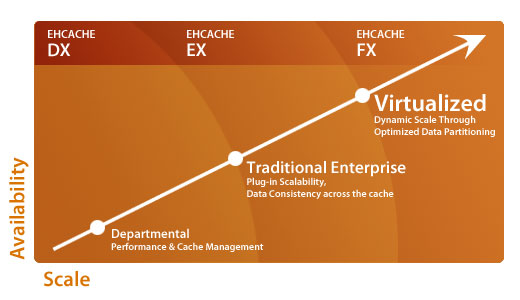Who should pay with open core?


Operators pay. Developers come in free. (Picture from Terracotta.)
"We tend to think developers get things free but operators should pay for advanced features that make it simpler for them to manage and operate," he explained.
Thus, "distributed cache is open source," while the new Ehcache 2.2 terabyte cache capability costs $8,000 per app node.
Wait a minute, did you say a terabyte of cache?
That's what Pandey, who joined Terracotta in 2006, said, and it can be turned on in just two lines of code. "A terabyte is bigger than 99.9% of the databases out there. So you can put your whole database into the memory footprint."
The large-scale caching capability is aimed at an Oracle product called Coherence, which is now on Version 3.6.
The primary reason we win against Oracle is we're simpler to use. We're giving people access to a very powerful, scaling product without the work Oracle requires of you. Therefore we can penetrate a more mainstream audience. This just reinforces that.
We haven't seen any caches bigger than 100 Gbytes before. It takes a lot of effort to build that. To say you don't need the work but can scale to a terabyte we're in a totally different league. And it's out of the box – it's just 2 lines of change in the cache and you can put in a terabyte. Oracle doesn't have that.
The new Ehcache also has a new management console which makes the whole product easier to use.
It's an interesting product announcement, but we're talking here of a paid product, with an open source core. Why talk about it at an open source blog?
Because many in the open source world have a tough time with the paid-unpaid boundary. Some find it unfair to have such a boundary, thinking it's a cheat.
I don't believe that to be the case, and I think Pandey's boundary -- operators pay while developers get in free -- makes sense. After all it's developers who create the software. They can add what's missing and turn the free product into just what enterprises get.
But for operators the price is relatively cheap, and they don't know how to make it anyway. Why not charge them a fair price?